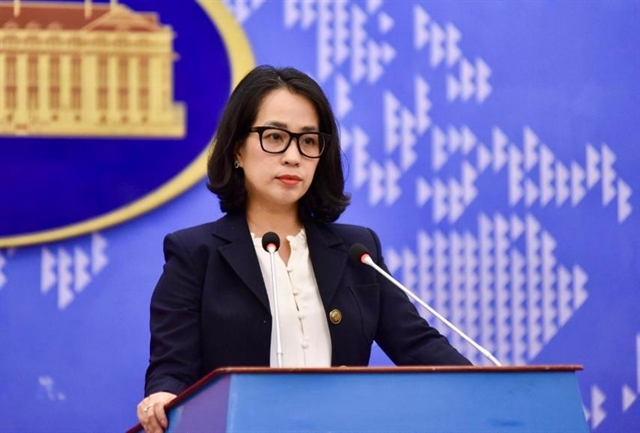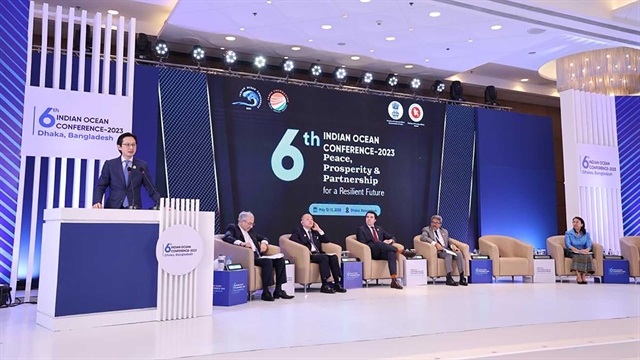 Politics & Law
Politics & Law

 |
| Deputy Foreign Minister Đỗ Hùng Việt delivers his remarks at the 6th Indian Ocean Conference (IOC) in Dhaka, Bangladesh from May 12-13. — Photo from the Ministry of Foreign Affairs |
DHAKA — Deputy Foreign Minister Đỗ Hùng Việt joined over 300 senior officials, researchers, and scholars from more than 30 countries worldwide at the 6th Indian Ocean Conference (IOC) in Dhaka, Bangladesh from May 12-13.
In his speech at the plenary session, the Vietnamese official shared his assessment of the situation in the Indian Ocean and Asia-Pacific regions, especially major challenges facing the region due to the impact of conflicts, disputes, and strategic competition among major powers, as well as non-traditional security issues.
Việt conveyed a three-point message for a peaceful, prosperous and solid future of the region, stressing the need to build an open and inclusive regional architecture based on fundamental principles of international law with ASEAN playing the central role; enhance mutual understanding and respect, build trust and conduct an independent and self-reliant foreign policy in the context of competition among major powers; and promote cooperation and partnership, especially maritime cooperation, through bilateral and multilateral mechanisms and a comprehensive approach.
The Vietnamese representative also emphasised the importance of respecting and complying with international law, especially the 1982 United Nations Convention on the Law of the Sea (1982 UNCLOS); and the necessity to respect the sovereignty, sovereign rights, jurisdiction, and legitimate maritime interests of each country in accordance with international law, and resolve disputes and differences through peaceful measures in line with international law.
Việt highlighted ASEAN’s efforts in implementing the Declaration of the Conduct of Parties in the South China Sea (DOC) and building a substantive and effective Code of Conduct in the South China Sea (COC) in accordance with international law.
He proposed strengthening cooperation and connectivity among countries in the Indo-Pacific region, especially with ASEAN member countries, in promoting sustainable development, turning the blue-sea economy into a motivation for sustainable and inclusive economic growth, and addressing non-traditional challenges.
In the framework of the conference Deputy FM Việt had bilateral meetings with State Minister for Foreign Affairs of Sri Lanka Tharaka Balasuriya, Australian Assistant Minister for Foreign Affairs Tim Watts and Secretary (East) of the Indian Ministry of External Affairs Saurabh Kumar.
During their meeting, Việt and Balasuriya affirmed that Việt Nam and Sri Lanka would continue to coordinate and support each other at international forums, and agreed to soon organise meetings of important bilateral cooperation mechanisms; strengthen cooperation on Buddhism and spiritual tourism; consider the opening of air routes connecting the two countries, and seek solutions to expand two-way trade and investment in the coming time.
Meeting with Việt, Tim Watts affirmed that cooperation with Việt Nam is always Australia's priority in both bilateral and multilateral frameworks. For his part, the Vietnamese official suggested the two countries fully tap the growth momentum of bilateral trade; facilitate cooperation in agriculture, labour and tourism; and expand cooperation to new areas of mutual benefit such as climate change response, digital economy, and energy transition.
During his meeting with the Indian official, Deputy FM Việt affirmed Việt Nam’s consistent policy of attaching importance to the traditional friendship and comprehensive strategic partnership with India. He suggested the two sides strengthen the exchange of high-ranking delegations, bolster cooperation in trade, investment, tourism, culture, people-to-people, and security-defence; and closely coordinate at multilateral forums.
Saurabh Kumar said India would continue to further expand cooperation with Việt Nam, especially in trade, oil and gas, and defence, and at international forums.
Themed “Peace, Prosperity & Partnership for a Resilient Future”, the 6th IOC discussed issues related to politics, economy, security, environment, and climate change, contributing to creating a premise for countries in and outside the region to promote cooperation, toward building an environment of peace, development and prosperity. — VNS

.jpg)


